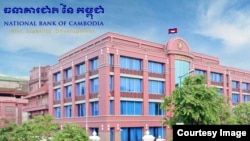A government-imposed interest rate cap on microfinance loans may lead the sector into crisis, analysts have said.
The analysts told VOA Khmer that the interest rate cap was a populist move by a government seeking to curry favor with its base ahead of local elections scheduled for June.
Earlier this month, the National Bank of Cambodia (NBC) announced that the interest rate on microfinance loans would be capped at 18 percent.
The announcement came shortly after Prime Minister Hun Sen spoke out against microfinance institutions that may appear to represent the state.
The NBC said in a statement that the rate cap was intended to protect the poor from exploitation and from falling into debt.
But Meas Ny, a social researcher, said the decision could have a backlash if people believed it to be part of an election strategy from Hun Sen’s ruling Cambodian People’s Party.
“Sometimes quick decisions help increase the popularity of politicians, but can leave scars or cause serious crises in the future,” he said, adding that if the CPP lost power at the next election, the incumbent would be saddled with the problem.
“The burden would fall to the next party... what we want to see is that the government must be very careful before they make such a decision,” he said.
San Chey, executive director of the Affiliated Network for Social Accountability Cambodia, said that small microfinance institutions would suffer as a result of the rate cap.
“The decision could be related to politics because some political parties have used the microfinance issue as a political message in the past. It’s obvious that the government wants to gain support from the people,” he said.
However, he said while the cap could hurt smaller lenders, it could be a useful tool to combat exploitation if imposed on larger institutions.
On Wednesday, Hun Sen said critics of the plan were themselves guilty of using the issue for political gain.
Financial expert Nget Chou, a senior consultant with Emerging Markets Consulting, said the sector did not have the means to deal with an interest rate crisis.
“The government still has many chances to improve all these issues, including work efficiency of the government. The possibility of fighting or reducing corruption is a major chance for the government to let ... creditors see us with confidence with high cooperation and probably the interest would drop along with this,” he said.
He suggested that an annual interest rate of 30 percent for the first year, dropping steadily to 18 percent over five or so years, to give the sector time to adjust.







